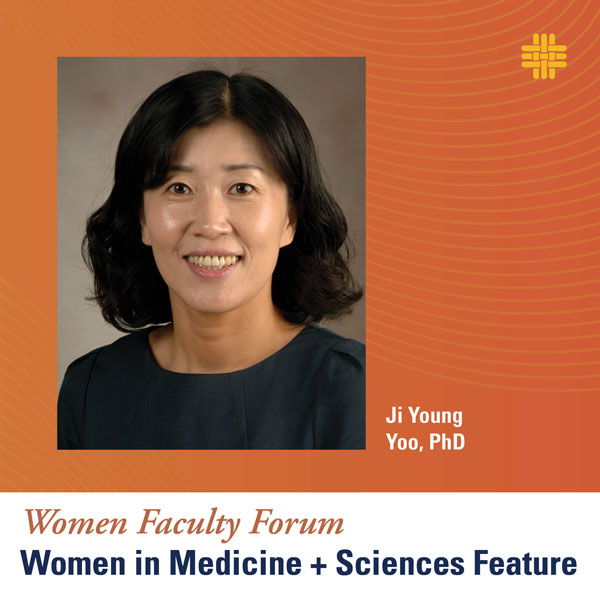Women in Medicine & Sciences Feature: Ji Young Yoo, PhD

Each month, the Women Faculty Forum presents its Women in Medicine and Sciences Feature, highlighting the women faculty at McGovern Medical School who are leaders in medicine, research, and education.
This month’s feature is Ji Young Yoo, PhD, associate professor in the Vivian L. Smith Department of Neurosurgery.
What is your background? When did you join UTHealth Houston?
I was born and raised in Jinju, South Korea. I earned my PhD in medical science, specializing in cancer biology, from Yonsei University College of Medicine under the mentorship of Dr. Chae-Ok Yun, a distinguished woman scientist in Korea. Under Dr. Yun’s guidance, my graduate research focused on developing anti-cancer therapeutic oncolytic adenoviruses and investigating their therapeutic efficacy and molecular mechanisms of action.
After completing my PhD in 2009, I moved to the United States to pursue postdoctoral training in the Department of Neurological Surgery at Ohio State University. In 2015, I was promoted to research assistant professor in the same department. In 2017, I joined UTHealth Houston as a tenure-track assistant professor in the Department of Neurosurgery. I also became a faculty member of The University of Texas MD Anderson Cancer Center UTHealth Houston Graduate School of Biomedical Sciences (GSBS), holding dual affiliations with the Cancer Biology and Therapeutics and Pharmacology programs.
What inspired you to pursue a career in science and medicine?
While I have always loved science, pursuing a PhD and a career as a scientist was not something I initially envisioned. I developed a deep fascination with molecular biology during college, especially DNA cloning and gene modification. My interest truly ignited when I learned about oncolytic virus therapy. Modifying viral genomes to create oncolytic viruses for cancer treatment was inspiring and revolutionary to me, and I became convinced of its potential to transform cancer care.
This passion led me to pursue a PhD in cancer gene therapy using oncolytic viruses. At the time, in the early 2000s, the field of oncolytic virus therapy was still in its infancy, and many people were unfamiliar with it or skeptical about its viability as a cancer treatment. Despite these challenges, I remained committed to the field, driven by my belief in its promise. Since the FDA approval of oHSV therapy in 2017, the field has gained significant momentum, with various oncolytic viruses now under development and clinical testing. Witnessing the growth and validation of this field over the years has been incredibly rewarding and reaffirms the importance of early dedication to innovative ideas.
What are your current research interests?
My research interest has mainly focused on developing therapeutically evolved oncolytic virus (OV) therapy for treating primary and metastatic brain tumors through an understanding of tumor microenvironment (TME) changes in response to oHSV therapy.
Locally injectable OV can improve patient survival and quality of life via tumor cell-specific destruction with concurrent activation of an adaptive anti-tumor immune response. As one of the OV therapies, oncolytic herpes simplex virus-1 (oHSV) has been approved by the FDA for melanoma (T-VEC, Imlygic®), while in Japan, conditionally approved for recurrent GBM (G47Δ, DELYTACT). It remains true, however, that significant hurdles exist as a limitation in the therapeutic efficacy of OV, which includes rapid viral clearance, increased angiogenesis, activation of pro-tumorigenic signaling, and immune suppression.
My laboratory has been particularly interested in identifying key mechanisms behind these limiting factors and improving viro-immunotherapy to increase response rates of oHSV therapy in cancer patients. Since being appointed to the UTHealth Houston faculty in June 2017, I have made several important discoveries regarding what defines the observed “key factors and key mechanisms” of such anti-viral resistances and immune suppressions.
Who are your role models?
My PhD mentor, Dr. Chae-ok Yun, is a trailblazer in gene therapy research using oncolytic viruses. When I joined her lab nearly 20 years ago, I was immediately inspired by her unwavering research dedication and commitment to mentorship. Dr. Yun’s high expectations and rigorous approach pushed me to excel and grow as a scientist.
She provided invaluable opportunities to present my research and engage with leading scientists, allowing me to build a strong professional network early in my career. Her encouragement instilled in me the confidence to pursue a scientific path, and her example continues to influence how I conduct my research and mentor my own students today. Dr. Yun’s guidance has been a cornerstone of my professional journey, and I am deeply grateful for her impact on my career.
What do you enjoy most about working at UTHealth Houston?
I lead a Neuro-oncology research lab, mentor students and postdoctoral fellows, and actively contribute to our medical school and the GSBS program. I deeply appreciate the collaborative environment at UTHealth Houston, where I have the privilege of working alongside exceptional basic scientists and clinical physician-scientists. The resources and support available here are remarkable, and I am grateful to be part of such an inspiring community.
UTHealth Houston is home to many outstanding women faculty members, including several talented Korean colleagues. I find immense joy in exchanging ideas and learning from them. As mothers, scientists, and educators, we share common challenges and experiences, offering one another invaluable support and encouragement. This sense of camaraderie enriches both my personal and professional life.
How do you think UTHealth Houston can further support female faculty?
UTHealth Houston, backed by its leadership and the Office of Faculty Affairs, has established a comprehensive resource suite to promote faculty success and development. These initiatives include a structured mentoring program that connects early-career faculty with seasoned mentors and workshops dedicated to leadership development, communication skills, and career progression.
Additionally, the Women Faculty Forum is a dynamic platform for networking, advocacy, and professional collaboration among women faculty members. These programs underscore UTHealth Houston’s dedication to fostering a diverse, inclusive, and supportive academic environment.